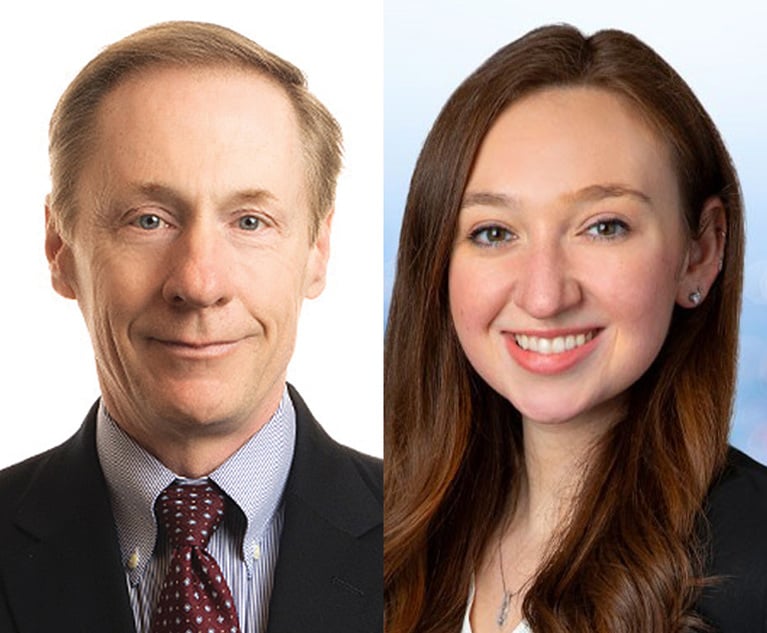2019 Unsung Hero—Ilana Eisenstein
Philadelphia-based partner and co-chair of the appellate practice, Eisenstein, is former assistant to the Solicitor General and a former federal prosecutor with experience at every stage of litigation—from investigation, through trials, appeals and the U.S. Supreme Court.
June 17, 2019 at 10:53 AM
3 minute read
By The Legal Intelligencer
 Ilana Eisenstein partner with DLA Piper.
Ilana Eisenstein partner with DLA Piper.
Ilana Eisenstein, DLA Piper
Philadelphia-based partner and co-chair of the appellate practice, Eisenstein, is former assistant to the Solicitor General and a former federal prosecutor with experience at every stage of litigation—from investigation, through trials, appeals and the U.S. Supreme Court.
Since her arrival at DLA Piper, her Supreme Court matter work has been impressive and addresses emerging legal issues businesses grapple with regularly.
In Masterpiece Cakeshop v. Colorado Civil Rights Commission, Eisenstein's team submitted a brief on behalf of nine national civil rights organizations urging the court to conclude that it is unlawful for businesses to discriminate against vulnerable populations. The brief expressed concern that the petitioners' proposed free speech exemption to anti-discrimination public accommodation laws could pave the way for businesses to lawfully discriminate against racial and other minorities.
In Dahda v. United States, the team drafted a brief on behalf of the Electronic Frontier Foundation and the National Association of Criminal Defense Lawyers arguing, among other things, that new technology has transformed the power and pervasiveness of wiretapping, making the territorial limits imposed upon it by relevant law that much more important.
In United States v. Shockley, the team submitted a brief on behalf of six former Missouri state court judges and a former chief justice of the Missouri Supreme Court, urging the U.S. Supreme Court to grant a petition for certiorari filed by death row inmate Lance Shockley.
In United States v. Brice, the team drafted a petition for a writ of certiorari on behalf of an indigent prisoner. The petition raises claims under Brady v. Maryland based on the government's suppression of evidence that the only other potential perpetrator had a motive to commit the crime, as well as a claim that confessions by the only other potential perpetrator were inadmissible.
What career path would you have pursued if you weren't a lawyer?
I've always been interested in advocacy and public policy, but also enjoy analytical rigor. Before I settled on law school I considered becoming an economist.
Name a mentor or someone you admire.
I've benefited from many wonderful teachers, mentors, coaches and colleagues over the years. My clerkship with Judge Edward Becker was an important turning point in my legal career. His dedication to public service, irrepressible work ethic, love of the law, and respect for lawyers and the profession continue to inspire me.
What is the best advice you ever received?
“Do try not to be boring,” parting advice by then-Harvard President Neil Rudenstine at our graduation. Still aspiring to that one!
In 50 words or less, what does the legal profession need to do to prepare the next generation of lawyers?
Lawyers need real opportunities to serve as advocates, to work on cases of substance and significance, and to be apprenticed, not just “trained.”
This content has been archived. It is available through our partners, LexisNexis® and Bloomberg Law.
To view this content, please continue to their sites.
Not a Lexis Subscriber?
Subscribe Now
Not a Bloomberg Law Subscriber?
Subscribe Now
NOT FOR REPRINT
© 2025 ALM Global, LLC, All Rights Reserved. Request academic re-use from www.copyright.com. All other uses, submit a request to [email protected]. For more information visit Asset & Logo Licensing.
You Might Like
View All
How Alzheimer’s and Other Cognitive Diseases Affect Guardianship, POAs and Estate Planning
7 minute read
Trending Stories
- 1Trump's Pick for SEC Chair Likely to Stymie Shareholder Proposals from ESG Advocates
- 2Adobe’s Chief Cyber Legal & Privacy Officer Talks Managing Gen AI Risks, Cyber Training
- 3The M&A Partners Who Drove the Most Business as Deal Leads Last Year
- 4Recent Ford Bronco Battery Recall Draws Pa. Class Action
- 5Office of Special Counsel Chief Challenges Firing 'Without Cause'
Who Got The Work
J. Brugh Lower of Gibbons has entered an appearance for industrial equipment supplier Devco Corporation in a pending trademark infringement lawsuit. The suit, accusing the defendant of selling knock-off Graco products, was filed Dec. 18 in New Jersey District Court by Rivkin Radler on behalf of Graco Inc. and Graco Minnesota. The case, assigned to U.S. District Judge Zahid N. Quraishi, is 3:24-cv-11294, Graco Inc. et al v. Devco Corporation.
Who Got The Work
Rebecca Maller-Stein and Kent A. Yalowitz of Arnold & Porter Kaye Scholer have entered their appearances for Hanaco Venture Capital and its executives, Lior Prosor and David Frankel, in a pending securities lawsuit. The action, filed on Dec. 24 in New York Southern District Court by Zell, Aron & Co. on behalf of Goldeneye Advisors, accuses the defendants of negligently and fraudulently managing the plaintiff's $1 million investment. The case, assigned to U.S. District Judge Vernon S. Broderick, is 1:24-cv-09918, Goldeneye Advisors, LLC v. Hanaco Venture Capital, Ltd. et al.
Who Got The Work
Attorneys from A&O Shearman has stepped in as defense counsel for Toronto-Dominion Bank and other defendants in a pending securities class action. The suit, filed Dec. 11 in New York Southern District Court by Bleichmar Fonti & Auld, accuses the defendants of concealing the bank's 'pervasive' deficiencies in regards to its compliance with the Bank Secrecy Act and the quality of its anti-money laundering controls. The case, assigned to U.S. District Judge Arun Subramanian, is 1:24-cv-09445, Gonzalez v. The Toronto-Dominion Bank et al.
Who Got The Work
Crown Castle International, a Pennsylvania company providing shared communications infrastructure, has turned to Luke D. Wolf of Gordon Rees Scully Mansukhani to fend off a pending breach-of-contract lawsuit. The court action, filed Nov. 25 in Michigan Eastern District Court by Hooper Hathaway PC on behalf of The Town Residences LLC, accuses Crown Castle of failing to transfer approximately $30,000 in utility payments from T-Mobile in breach of a roof-top lease and assignment agreement. The case, assigned to U.S. District Judge Susan K. Declercq, is 2:24-cv-13131, The Town Residences LLC v. T-Mobile US, Inc. et al.
Who Got The Work
Wilfred P. Coronato and Daniel M. Schwartz of McCarter & English have stepped in as defense counsel to Electrolux Home Products Inc. in a pending product liability lawsuit. The court action, filed Nov. 26 in New York Eastern District Court by Poulos Lopiccolo PC and Nagel Rice LLP on behalf of David Stern, alleges that the defendant's refrigerators’ drawers and shelving repeatedly break and fall apart within months after purchase. The case, assigned to U.S. District Judge Joan M. Azrack, is 2:24-cv-08204, Stern v. Electrolux Home Products, Inc.
Featured Firms
Law Offices of Gary Martin Hays & Associates, P.C.
(470) 294-1674
Law Offices of Mark E. Salomone
(857) 444-6468
Smith & Hassler
(713) 739-1250







